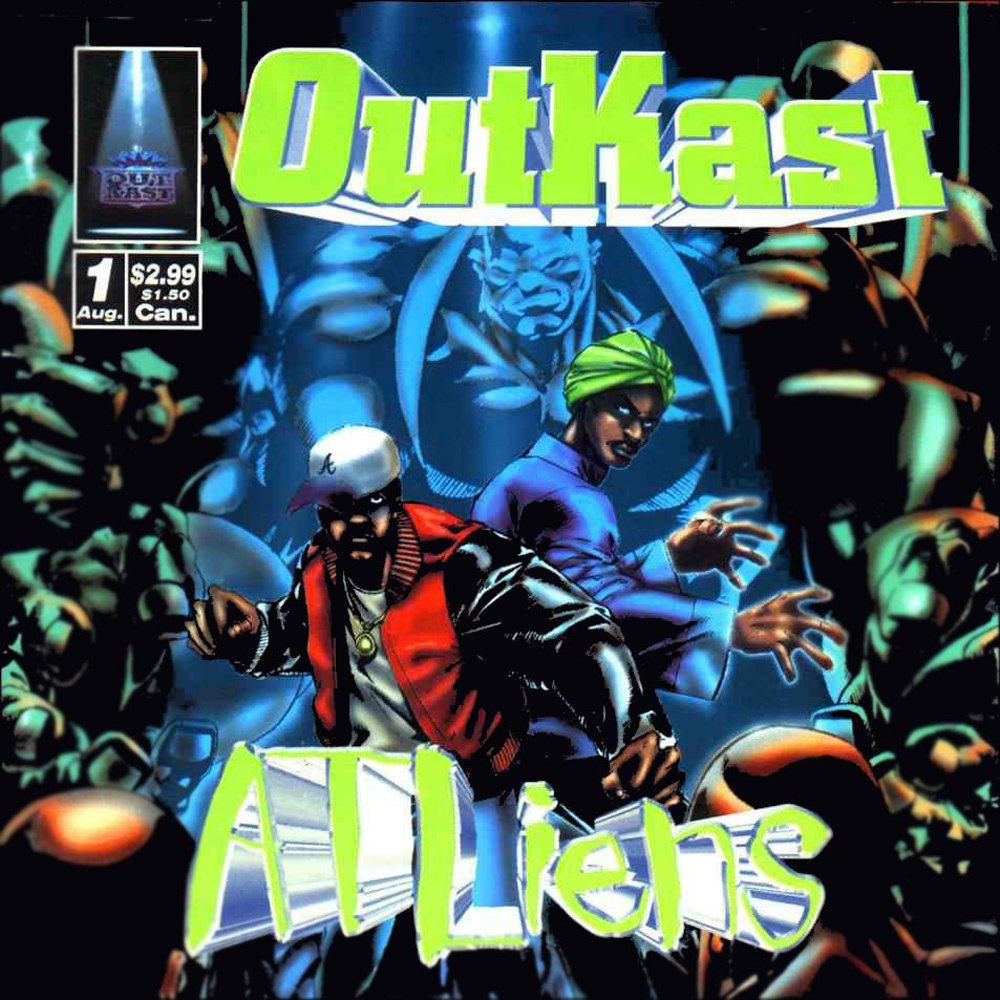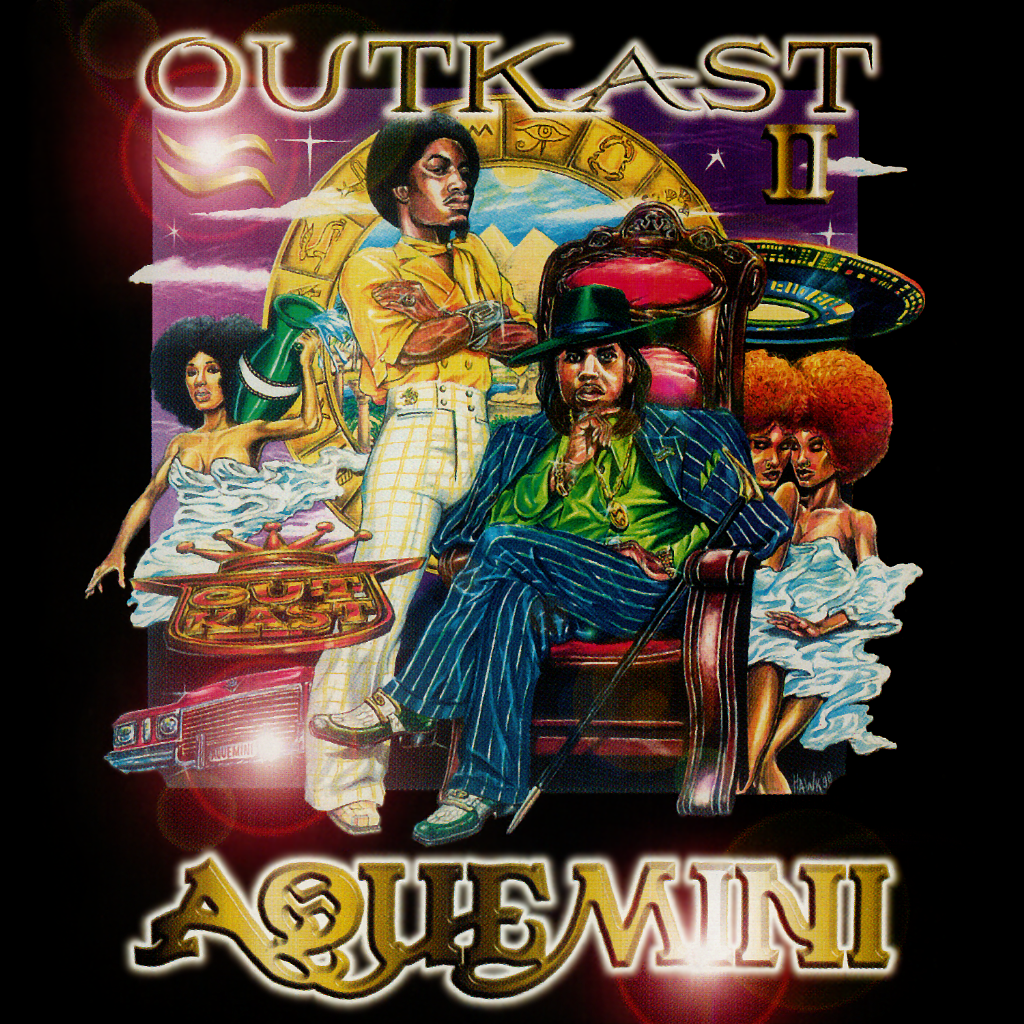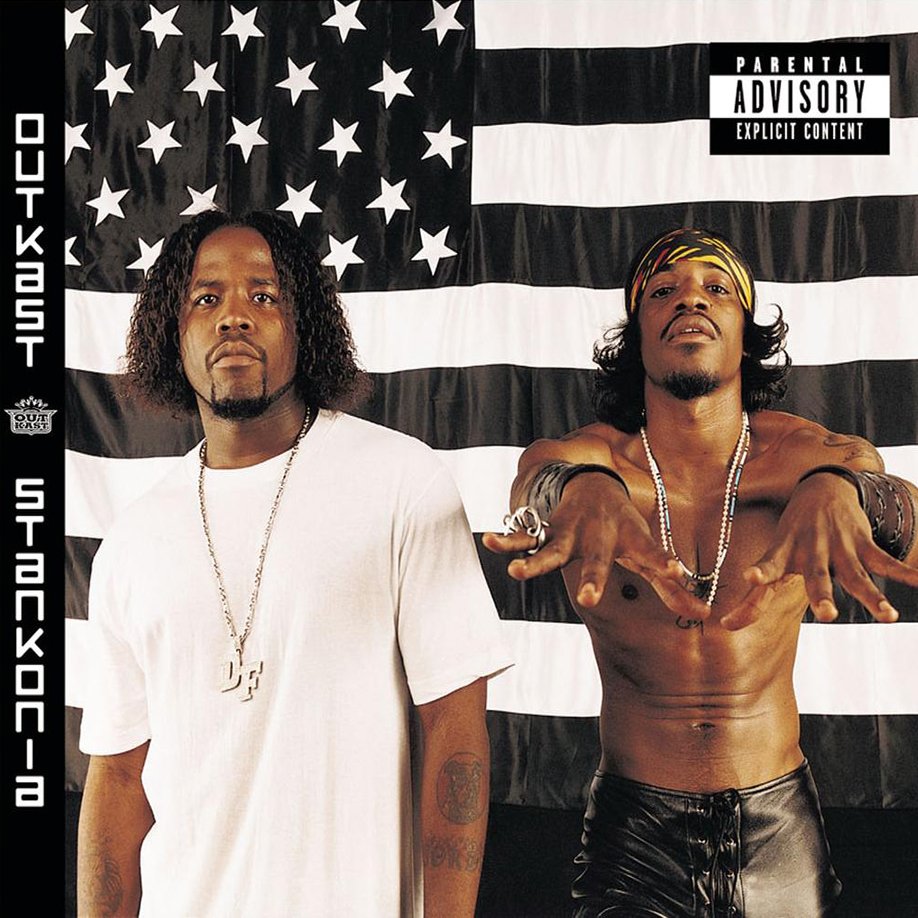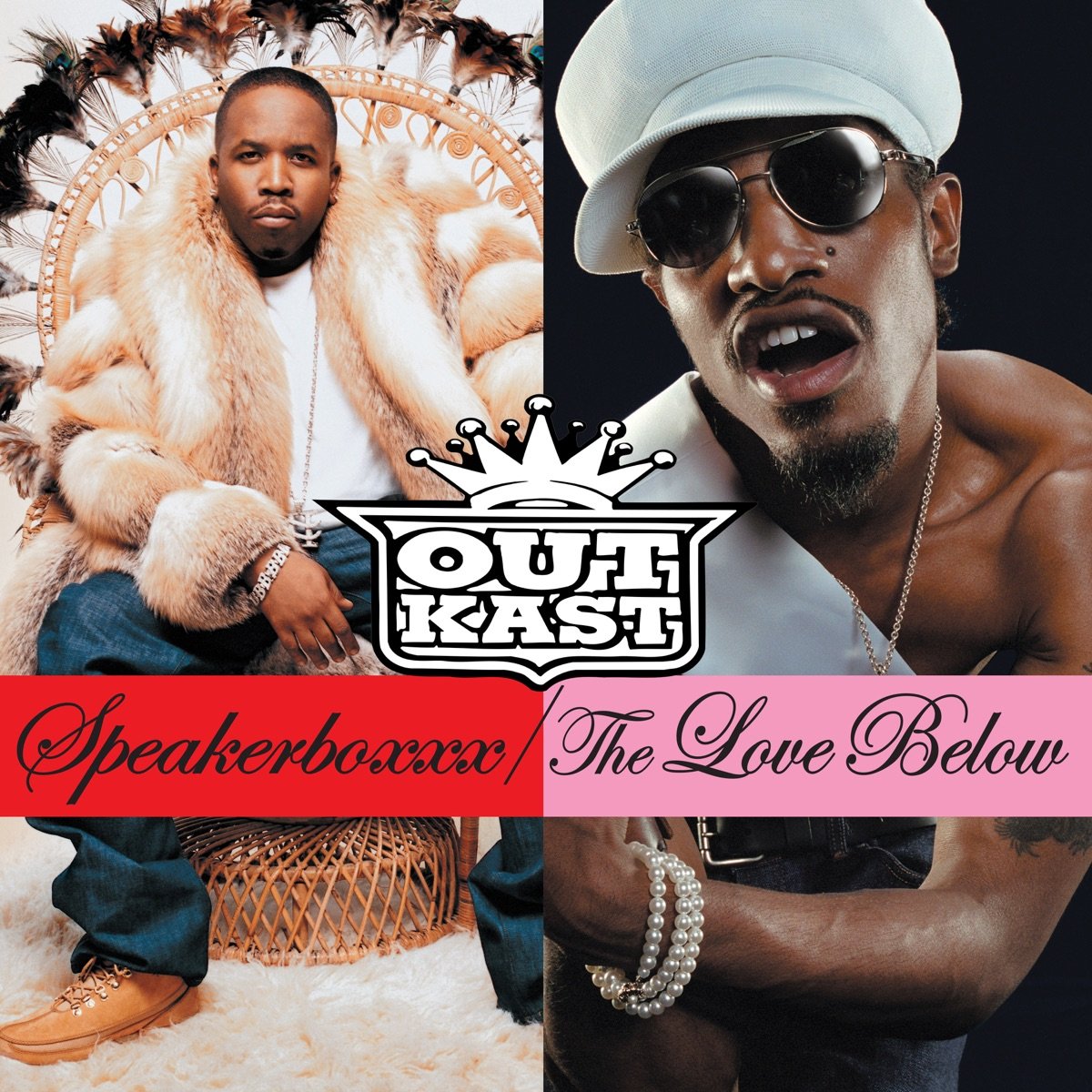Happy 30th Anniversary to OutKast’s debut album Southernplayalisticadillacmuzik, originally released April 26, 1994.
The 1995 Source Awards is remembered as a contentious and confrontational affair. Immediately following the event, most media coverage focused on the incredibly stupid East Coast vs. West Coast beef, zeroing in on the apparent declaration of “war” by Death Row Records against Bad Boy. These moments included Suge Knight’s not-at-all veiled dis to Puff Daddy when accepting the award for Motion Picture Soundtrack of the Year for Above the Rim (1994) and Snoop Dogg berating the increasingly combative audience for not showing proper love to himself and Dr. Dre after the latter won Producer of the Year.
Another moment that went largely unacknowledged at the time proved to be the most important. During the second award presentation of the night, the Atlanta duo OutKast won for New Artist of the Year (Group), soon after releasing their wildly popular debut Southernplayalisticadillacmuzik. André “3000” Benjamin and Antwan “Big Boi” Patton took to the stage, flanked by their Dungeon Family cohorts Goodie Mob, to a rather frosty reception from the Madison Square Garden crowd. After some shout-outs from Big Boi, André took the mic, visibly frustrated by the reaction to their win. After thanking God, Dre declared, “I’m tired of folks…them close minded folks. It’s like we got a demo tape and don’t nobody want to hear it. But it’s like this: The South got something to say. That’s all I got to say.”
There’s a reason that OutKast later replayed the entire sequence to close their third album Aquemini (1998). The words, as brief as they were (Dré’s “speech” lasted less than 20 seconds), became a fitting statement of purpose for OutKast, the Dungeon Family, and southern hip-hop moving forward. And the duo perfectly demonstrated why they deserved to be heard on Southernplayalisticadillacmuzik, released 30 years ago.
Southernplayalisticadillacmuzik did indeed capture André and Big Boi having something to say. Mostly about how they were living. We writers can be weird, working to ascribe lofty intentions to great albums after the fact (I’m as guilty of this as anyone), when in reality, most of the time it’s just an artist or group describing what was going on in their lives and trying to make the best music that they could.
Big Boi and André certainly made describing their lives look easy on their debut. At the time, the pair were teenagers, fresh out of high school, and dealing with much of the same shit that young men their age dealt with in urban areas throughout the United States. Often they speak on smoking weed. At other times, they rap about rolling through the streets of Atlanta in a Cadillac. But throughout Southernplayalistic, they utilize complex flows and word play to describe their lives trying to navigate Southwest Atlanta a.k.a. SWATS.
Sometimes Dré and Big Boi rap with wisdom beyond their years. Sometimes they sound like every bit their age. Sometimes it’s a combination of both. As Dré raps on the album-opening “Myintrotoletuknow,” in a couple of lines that are simultaneously profound and a bit juvenile, “Come and listen to my story, I gots a lot of shit up on my mind / I wipe the boo-boo from my brain, then I finish up my rhyme.”
Watch the Official Videos:
In terms of their rapping style and approach, OutKast drew from many sources. The duo have frequently said that they grew up listening to everything, from Al Green to Bob Marley to Metallica; Big Boi’s deep and abiding love for the music of Kate Bush is well-documented. That being said, they were very much hip-hop heads, influenced by not only the 2 Live Crew’s of the world, but also De La Soul, A Tribe Called Quest, and the Hieroglyphics crew.
Another absolutely essential element to Southernplayalistic’s success was the Organized Noize production team, who provided both the musical backdrop as well as the “vision” for the duo. Made up of the late Rico Wade, Sleepy Brown, and Ray Murray, the production crew had been working in the Atlanta area with local rap and R&B artists. The crew “discovered” OutKast and brought them to the studio in the basement of Wade’s mother’s home, known as The Dungeon. While there, they helped develop Big Boi and Dré as emcees, and further refined the philosophy of the group. Dré and Big Boi learned game from Organized Noize and other artists that frequented the Dungeon, including both R&B/Soul singers like Joi and local rap crews like Parental Advisory.
Organized Noize were also production pioneers who created a timeless sound. Their production style featured a contrast that involved putting hard-hitting drum tracks behind live instrumentation. The team was not the first to mix sampled material with studio musicians, but few were as good as them when they did so. And, fittingly, their tracks had a distinctly “Southern” flair that was both funky and soulful.
Together, OutKast and Organized Noize brought what was then a new perspective to the hip-hop world. Throughout much of the 1980s and 1990s, Atlanta was mostly known for its “booty music” scene. Very few hip-hop artists and groups from the city that didn’t record dance oriented music received substantial attention on the national level. OutKast’s straight-ahead sensibility on Southernplayalistic was relatable to people from all backgrounds, which opened up a whole new world for the Atlanta hip-hop scene, laying the groundwork for what was to come over the next three decades.
OutKast officially introduced themselves with “Player’s Ball,” a Christmas song masquerading as a “life in the hood” song, or vice versa. Everything about the song is legendary, from Rico Wade’s opening soliloquy to Sleepy Brown’s hook, to the infectious organ-based track, to Big Boi and Dré’s detailed descriptions of how their day unfolds. The single was certified Gold and properly whet listeners appetites for the entire project.
When it came to promoting Southernplayalistic’s release, LaFace Records utilized the annual Freaknik festival to maximum effect. The Atlanta-based event, which ran through much of the 1980s and mid-1990s, drew thousands of primarily African American college students, many from HBCUs around the country, to Atlanta the third week of April every year. In 1994, that weekend fell just before the release of Southernplayalistic. As explained in the documentary Freaknik: The Wildest Party Never Told (2024), LaFace street team members descended on the festival, bombarding the attendees with samplers for the album, so that it eventually could be heard coming out of nearly every car in the Atlanta University Center and downtown. The students went back home and spread the word about the music, helping fuel Southernplayalistic’s early success.
Enjoying this article? Click/tap on the album covers to explore more about OutKast:
Southernplayalistic’s second single, the title track, proved to be an even stronger entrée into what the duo was about. Organized Noize created a smooth guitar and horn laden track, complete with a Parliament-Funkadelic inspired chorus (sung a la “ChilDrén of Production”). Meanwhile, Dré and Big Boi are as out-and-out cool as they’ve ever been on a record, promising to “drop them ’bows like Dusty Rhodes” and warning doubters not to sleep on their skills lest they get “served with some Southern Hospitality.”
Personally, while I still love Southernplayalistic’s singles, these days I find myself gravitating towards some of the lesser known album cuts. “Ain’t No Thang” is a detailed portrait of Dré and Big Boi working to find themselves as young men, tempted to use violence as a means to solve their problems. “Claimin’ True” explores similar territory, as both emcees describe how one’s upbringing can inevitably lead to lives of crime and incarceration. “I pledge allegiance to the streets, that's where I growed up,” Big Boi raps. “And made more money 'cause my daddy never showed up / But fuck it, I'm on my own, I'm in my zone / Ain't nothing wrong, you don't belong, you left me standing alone.”
“Hootie Hoo” isn’t profound, but it’s certainly a blast. It features one of Organized Noize’s most stripped-down productions of their era, held down by one of their heaviest and most resonant basslines. Big and Dré take pleasure in describing their escapades during wild nights “from the streets of ATL to the slums of College Park.” The song also features one of the most infectious hooks that they ever recorded. Spontaneous chants of “Hootie Hoo!” were a common refrain throughout my sophomore year of college.
Southernplayalistic is also pretty well known for its efforts to introduce other members of the Dungeon Family, specifically Goodie Mob (credited in the album’s liner notes as “Goody Mob”). “Git Up, Git Out,” the album’s third single, features Cee-Lo and Bigg Gipp. Big Boi and Dré both do their thing, but Cee-Lo gives a star-making performance with his opening verse, carrying on an extended argument with himself (sometimes from the perspective of his aunt) in order to find motivation to succeed in life. Big Gipp also firmly put himself on the map with his performance, best known for the dis towards Eldin Bell and Maynard Jackson, Atlanta’s chief of police and mayor at the time respectively, for casting aside the city’s poor residents while preparing for the 1996 Olympics.
“Call Of The Wild,” featuring T-Mo and Khujo, the other two members of Goodie (or “Goody”) Mob, is a hauntingly effective entry. All four emcees adDréss the seemingly inexorable “call” towards a life a crime that the inner-city streets emit towards young Black residents. André is particularly philosophical, rapping, “To graduate is really becoming a very stressful journey / I feel like a steering wheel, for them is trying to turn me / Into a hatemonger, and I'm wishing and I wonder / ‘Damn, will I graduate before I hit the summer?’”
And some songs don’t feature Dré or Big Boi at all. “Funky Ride” puts the spotlight firmly on Society of Soul, which was Organized Noize by another name. The song is unlike anything else on Southernplayalistic, with Sleepy Brown crooning blissed vocals over slow and deeply funky grooves. Channeling the music of Parliament-Funkadelic, Prince, The Time, and others, the crew put on a suitably virtuoso performance, and one that knocked hard AF, as the window-rattling drums sounded great coming out of car speakers. Society of Soul would later release their sole album Brainchild (1995), but it pretty much went unnoticed, sandwiched in-between the releases of Southernplayalistic and Goodie Mob’s Soul Food (1995).
“Crumblin’ Erb” has long been my personal favorite track on the album. It’s the most outwardly melancholy recording on the project, with the duo explaining the psychological stresses and trauma that go along with selling drugs. Big Boi and Dré explain how weed becomes a useful tool to cope with these stresses, as well as the violence and pain that surrounds them. It features what’s Organized Noize’s strongest production on Southernplayalistic, as they mix watery guitars with reggae-influenced horn stabs and subtle percussion.
Southernplayalistic’s stature has only grown in the past three decades. I’d guess that it’s at least partially related to OutKast’s enduring popularity. OutKast has become one of the most universally acclaimed and beloved groups of all time. The duo built their legend in many ways because of what came after their debut, adopting new styles and approaches to music. They continually challenged their audience to follow them on their musical journey, with their debut serving as an outstanding starting point.
It’s often posited that Southernplayalistic was underrated at the time of its release. The Source magazine, the “hip-hop bible” throughout the genre’s golden era, came under fire for perceived regional bias after OutKast’s debut received 4.5 mics, instead of the 5 Mic rating given to Nas’ Illmatic, which dropped just days before. On Stankonia (1998), OutKast’s third album, Big Boi proclaimed that he “need[ed] my other half a mic.” I always thought the sentiments missed the point, as receiving 4.5 mics from The Source wasn’t exactly a dis.
You can’t argue with the album’s success and impact. Southernplayalistic was certified platinum, and it opened the minds of audiences worldwide, now eager to hear what OutKast, along with other artists from the South, had to say. It’s not accurate to argue that it started hip-hop’s Southern Renaissance, but it set the set the stage for the movement to happen. OutKast earned people’s attention with their debut and established that they weren’t going to be underestimated by anyone.
Listen:





